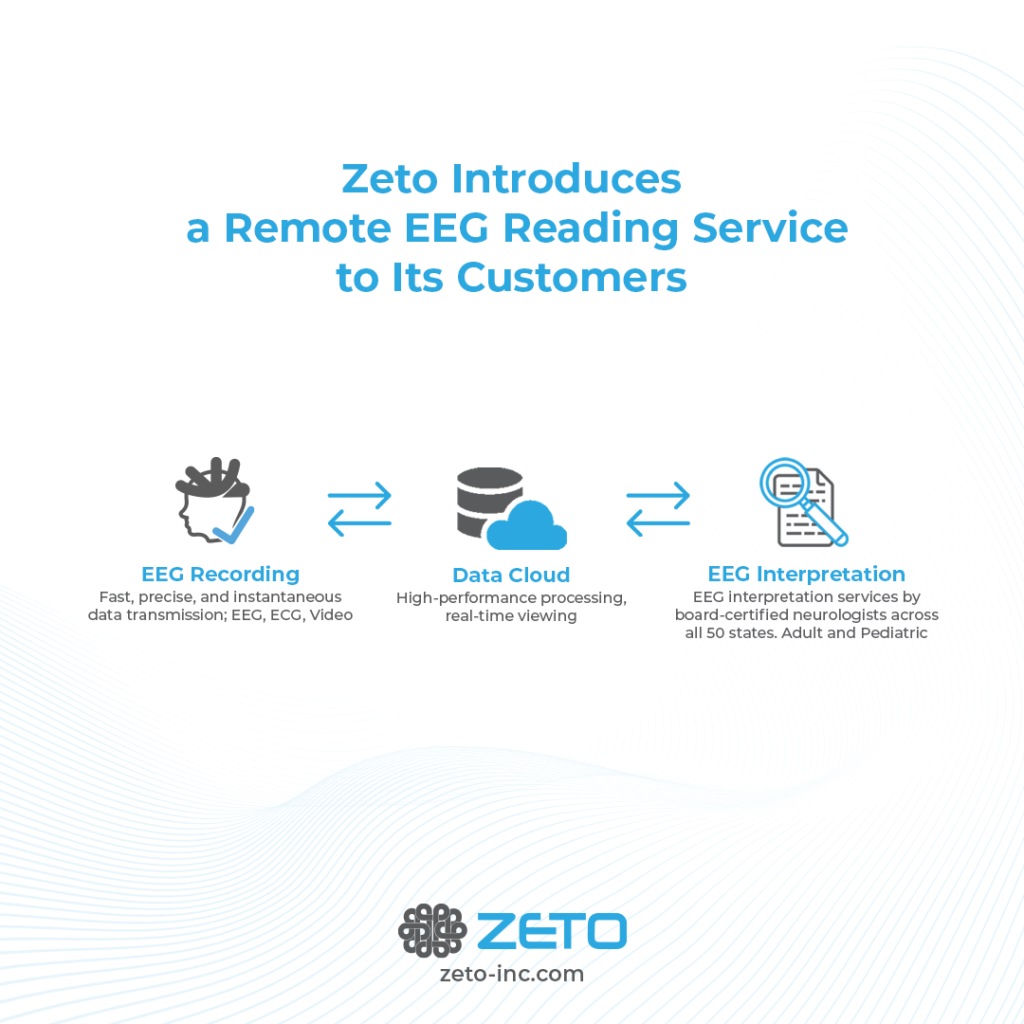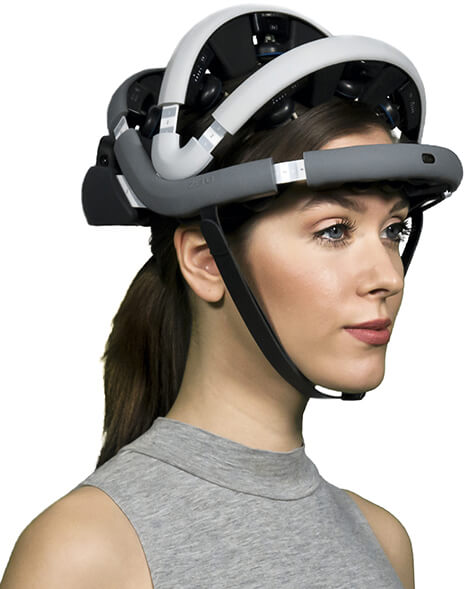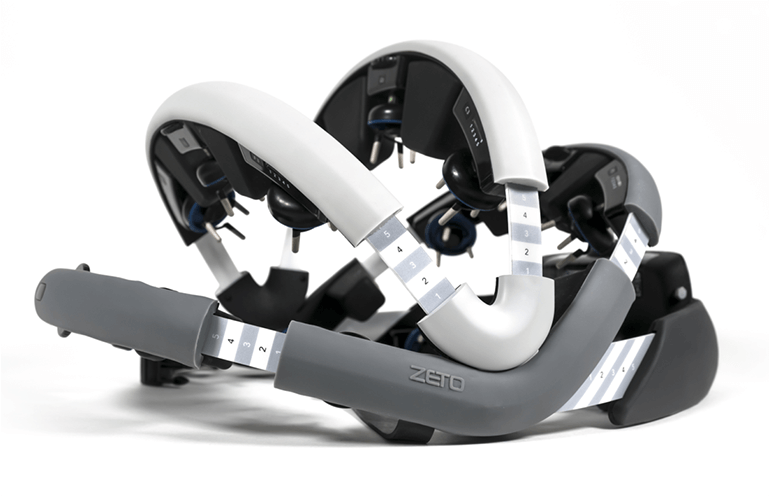EEG is the gold standard for observing and characterizing neural activity, but patients are subject to lengthy and uncomfortable preparation for scans, and interpretation is subjective to the physician who reads it. Zeto has introduced a device designed for patient comfort and simple setup, which uses “active” dry electrodes capable of picking up cerebral activity with high digital resolution and less noise.
In Greek, the word zeto means “to live.” By that token, neural monitoring start-up Zeto Inc. was brought to life from the seed of a business school idea, with hopes of improving countless lives. Zeto’s CEO Aswin Gunasekar was in business school at the University of Texas, Austin, when he took an interest in epilepsy diagnosis after watching a family member battle the condition. Quickly realizing that the electroencephalogram (EEG), the gold standard for monitoring neural activity, has had few updates since its invention early in the 20th century, innovation was an immediate priority for Gunasekar.
Current EEG systems are uncomfortable for patients, inefficient due to their lengthy setup, and variably interpretable in their output. Leveraging years of experience as an electrical engineer developing microprocessors, Gunasekar conceived of a business plan for an easy-to-use EEG testing alternative, which helped his MBA team win the venture creation class’ competition in 2013.
Gunasekar continued to develop it as he moved to Silicon Valley to work for PwC. During this period, his idea shifted from a patient-use home monitoring device to a professional, clinical, medical device. As it is today, the Zeto solution incorporates feedback from several hundred patients, neurologists, and EEG technologists to ensure its practicality in addressing the biggest pain points of those who use it most frequently.
Traditional EEG is used to observe seizures and diagnose epilepsy, sleep disorders, autism, stroke, concussion, and more. Testing involves the placement of 20 electrodes on the scalp, abrading the surface of the skin to lower impedance and using viscous gel to improve conductivity in order to boost the signal detected. The process requires a specially trained technologist and can take up to two hours to yield just 30 minutes’ worth of test results, the rest of the time lost to preparation, adjustment and clean up. The signal, once recorded, is highly intricate with many discrete elements that are challenging to translate into useful information.
Current EEG systems are inherently expensive to operate and maintain with such cost drivers as the time consumed, labor, equipment, consumables, maintaining the digital infrastructure to allow remote access for physicians as well as storage and archiving of patient recordings. Consequently, additional expenditure is incurred for IT personnel, third-party software, and data retrieval. According to Gunasekar, the broken EEG value chain has led to underutilization of EEGs in most US hospitals and unavailability in many rural, emergency, and international settings.
Finally, there is also a high degree of subjectivity between readers of EEG output. Signals are often manually annotated in various formats, with the data largely unstructured and not machine learnable.
“Today, the burden of obtaining a good signal is completely on the EEG technologist,” Gunasekar says. The placement of the sensors, as well as the mitigation of peripheral electrical activity that clouds the brain signal
with noise, requires training and experience to perfect. Precision placement is also a priority, as the goal is to capture neuronal activity at precise regions of the brain.
With Zeto’s device, a headset that resembles a bicycle helmet, much of the finessing required with traditional
EEG systems is eliminated. The sensors, designed for patient comfort, are mounted on a semi-rigid but adjustable frame, positionableto precise locations and calibrated to work dry (sans coupling gel), with no skin preparation, through all types of hair. In addition to EEG, Zeto’s patent pending hardware contains an added ECG sensor as well as video and auxiliary inputs for comprehensive monitoringcapability. Three clinical evaluations across 50 patients and the FDA clearance have so far validated that the device is at least
as effective as standard EEG systems with a more patient-friendly design and proprietary techniques for signal enhancement. The latter includes
Active Electrode Technology, which preamplifies and conditions the neural signal at the source, and Dynamic
Noise Cancellation, which detects and removes noise in real time, as audio headphones with a similar purpose do. Zeto’s revolutionary hardware connects to its intuitive cloud software that enables a secure, evolving AI engine with machine learning capability (currently in development), which will allow it to improve continuously through use as it gains experience. First, the data are standardized into a functional, searchable format, then are processed by the software to generate autonomous reports and assistance to give new insights to the attending doctor. By bringing to market arguably the most significant advancement to EEG technology since its inception, Gunasekar is aiming to not only disrupt the market, but lead it.
“We want to aid physicians tremendously with the EEG diagnostic for the future,” says Gunasekar. In line with this pursuit, Zeto is offering EEG interpretation services by board-certified neurologists to bridge any gap in knowledge when examining a particular scan. The combination of human expertise and tireless machine assistance will maximize the potential for meaningful analysis, overcoming the complexity and subtlety of neural signals. This new approach, for example, can guide attention to an area of the brain with particularly relevant activity, and search for similar patterns and connectedness to other regions across extended periods. That may lead to a more thorough understanding of neurological interaction and afflictions.
Zeto is introducing the first EEG headset backed by a cloud system to be cleared by the FDA for clinical use,
according to Gunasekar, who notes that the company is currently preparing for a CE mark. Zeto’s revenues will come from a capital equipment or subscription model, considering the pay-as-you-go nature for cloud connection and support. All of the company’s manufacturing is completed in-house, with production capacity capable of exceeding a few hundred units per month.
Gunasekar notes that both thought leaders and marketing partners will be engaged to help push Zeto to the forefront of the conversation among hospitals and clinics. The ease of its use allows for a demonstration that proves the product’s effectiveness in minutes, underscoring the intuitiveness of the headset, and serving as an instant visual representation of its increased efficiency and comfort over traditional EEG solutions.
With over 20 million clinical EEG procedures performed each year globally, Zeto’s initial target application of
short-term routine scans represents a $1.5 billion market, while follow-on products will address a $4 billion longterm EEG sector, and eventually a $10 billion future market that can positively impact autism, stroke, and concussion.
By Gunasekar’s assessment, Zeto’s 19-person close-knit team is its engine of innovation. “We have an incredibly passionate team that is locked in on transforming this space,” he says, “but we will really be smiling once our product has made this important medical test available to millions of people in
the world who need it.” The company is currently in an A round of financing, seeking $12 million, to fund its imminent commercial launch with an oversubscribed order pipeline for 2019.
Source – MedTech Strategist



